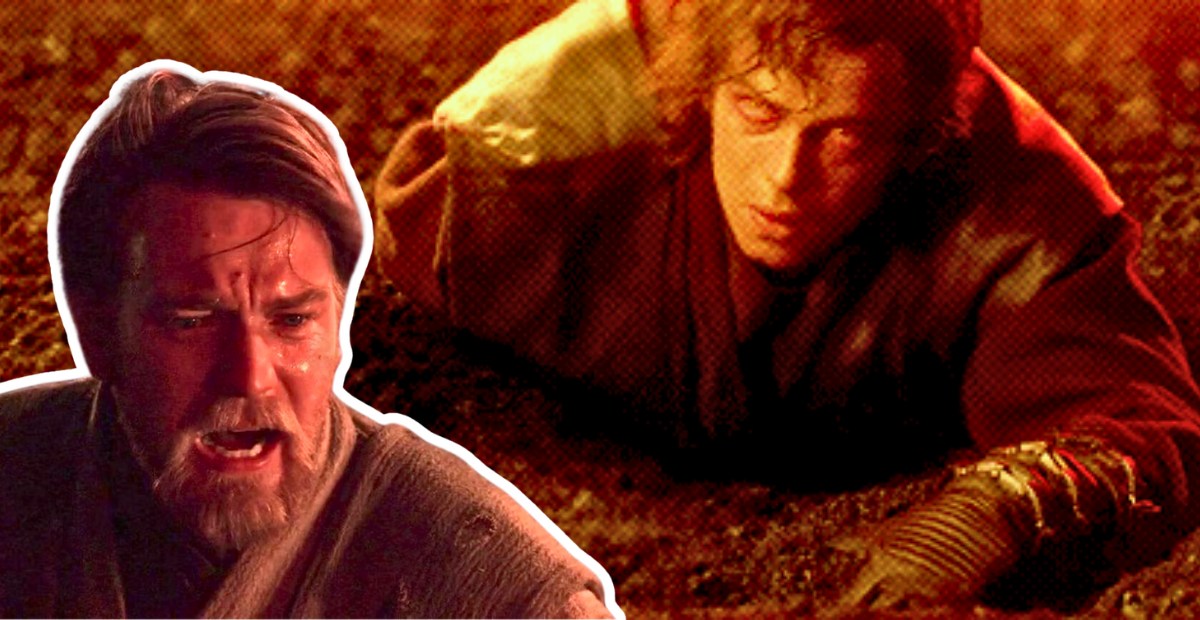When Obi-Wan Kenobi and Anakin Skywalker faced off on Mustafar, it marked one of the most emotional and intense moments in Star Wars history.
But the aftermath of that battle has left many wondering: Why didn’t Obi-Wan just put Anakin out of his misery when he was clearly dying in such a gruesome way?
Let’s get into the real reasons, one by one, because it’s not as simple as it might seem.
1. Obi-Wan’s Emotional Conflict and His Love for Anakin
Obi-Wan and Anakin had a bond that went beyond just a Jedi Master and his Padawan. To Obi-Wan, Anakin was like a brother, maybe even a son.
Killing him, even after everything Anakin had done – turning to the dark side, slaughtering Jedi (including younglings), and trying to kill Padmé – was too much for Obi-Wan to bear.
You can feel this emotional struggle in that iconic line from Revenge of the Sith: “You were my brother, Anakin. I loved you.”
It wasn’t about justice or revenge for Obi-Wan. His love for Anakin ran deep, and after their brutal duel, it wasn’t the physical defeat that left Obi-Wan shattered; it was the emotional and personal loss.
He had trained Anakin, watched him grow, and now he had to witness him become a monster.
Putting Anakin out of his misery would have been like putting down someone he loved dearly, and no matter how much Anakin deserved it, Obi-Wan just couldn’t bring himself to do it.
2. The Jedi Code and the Will of the Force
Another big factor was the Jedi code. The Jedi have a strict belief that they do not kill defenseless opponents.
By the time Anakin was lying there, burning and dismembered, he wasn’t a threat anymore – he was a broken, helpless man.
Obi-Wan, ever the devout Jedi, couldn’t bring himself to violate that code.
In the Revenge of the Sith novelization, this idea is further explored. Obi-Wan believed it wasn’t his place to kill Anakin. He trusted that the Force would decide Anakin’s fate.
This is a classic Jedi philosophy – let the Force guide and determine the outcome rather than acting out of anger or vengeance.
Obi-Wan stayed true to his Jedi training even in the face of unbearable pain and emotional trauma.
You can see this theme play out again in Return of the Jedi when Luke refuses to strike down Vader in anger.
It’s a core principle of the Jedi, and it was something Obi-Wan lived by, even when faced with one of the most difficult choices of his life.
3. Obi-Wan Thought Anakin Would Die Anyway
Another factor is that Obi-Wan likely believed Anakin would die soon enough from his injuries. After all, Anakin had just lost three limbs and was literally burning alive.
Even if Obi-Wan couldn’t bring himself to deliver the final blow, he probably thought he didn’t need to. The lava was right there, and it looked like Anakin only had minutes to live.
Obi-Wan may have thought, “The lava will do what I can’t.” In that moment, it probably seemed to him that Anakin’s fate was sealed.
But as we know, Anakin’s connection to the dark side gave him enough strength to cling to life until Palpatine arrived.
This assumption that Anakin would die on his own adds another layer to Obi-Wan’s choice to walk away.
It wasn’t about cruelty; it was about thinking the decision was out of his hands at that point.
4. Time Constraints and Palpatine’s Approach
On top of everything else, Obi-Wan was also racing against the clock. Palpatine was on his way, and Obi-Wan could sense it.
He didn’t have time to spare if he was going to get Padmé to safety. The longer he stayed, the greater the risk that Palpatine would show up and possibly overpower him.
At this point, Obi-Wan knew that the future of the galaxy depended on getting Padmé to safety, not finishing Anakin off.
In the Revenge of the Sith novelization, it’s mentioned that Obi-Wan could sense another Sith Lord approaching – Palpatine.
With time running out, his priority shifted to getting off Mustafar as quickly as possible, even if it meant leaving Anakin to his fate.
Final Thoughts
Obi-Wan’s decision to leave Anakin wasn’t easy, and it wasn’t simply a matter of letting him suffer.
It was a combination of emotional turmoil, his deep Jedi beliefs, the assumption that Anakin would die on his own, and the pressing need to escape before Palpatine arrived.
All of these elements came together to create one of the most heartbreaking and complex decisions in the Star Wars saga.

